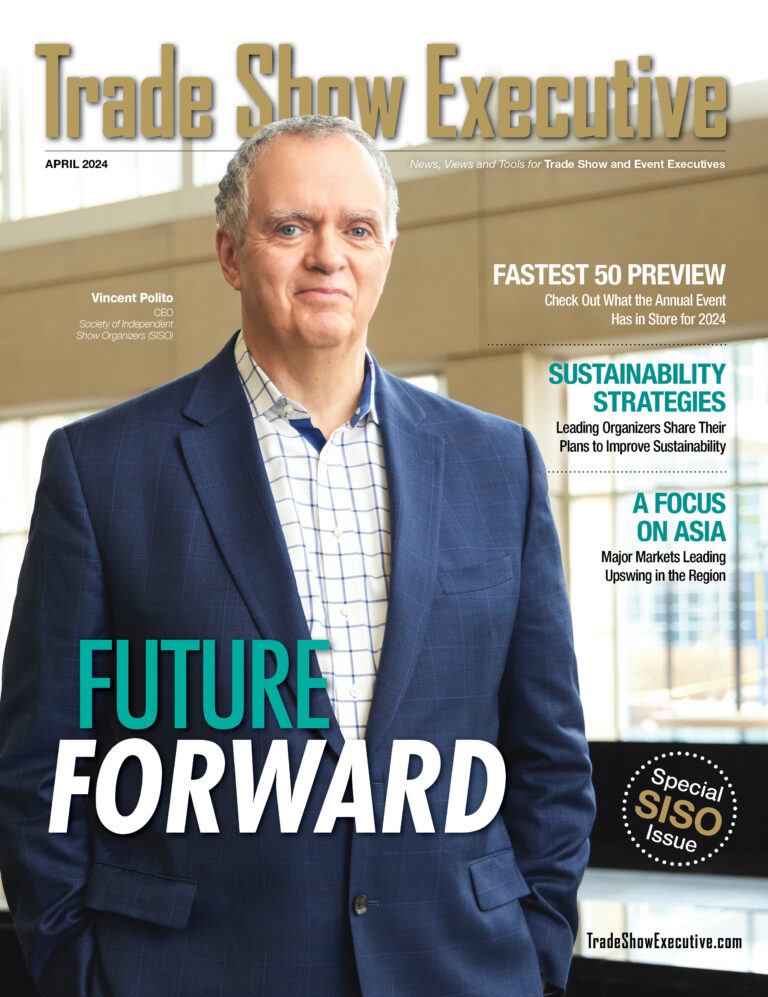
A former SVP of Organizational Development at UBM who now runs a successful C-suite advisory and consultancy practice, Angela Scalpello is a sought-after speaker on topics such as leading with emotional intelligence in uncertain and complex environments.
TSE turned to Scalpello for her advice on leading during the COVID-19 crisis.
Q. The COVID-19 issue is causing consternation throughout the world. How can leaders in the trade show industry navigate this uncertainty?
A. Emotions are contagious, and they do not exist in a closed-loop system. What senior leadership exhibits in their own words and actions will become contagious in the organization. Although leaders can have anxiety and fears for their safety, their family’s safety and the business’ health, leaders must be the stability in a time of ambiguity and risk. In addition, leaders can positively impact their situation by keeping their employees and customers well informed. In today’s information-rich society, we may believe that people are being correctly informed by many different sources, but that is not the case. Organizations have the responsibility to get information from reliable sources and then curate it within the context in which we’re operating and doing business.
Leaders must be tethered in the reality of the situation, but they must also be generous with hope. Many of us in this industry have been through other crises, but they end and we can come out stronger. We’ve been through a number of epidemics in this global industry such as SARS, Ebola and HIV, yet, we know that if we handle it well, we come out stronger.
Q. How do we come out stronger from a business, employee and customer perspective?
A. You cannot put your bottom line before your employees and your customers, especially in a crisis such as this. People’s lives could be at stake or their health compromised. So what do we need to do? We can allow people to work remotely. Make sure they have the necessary tools and resources. Identify who are the decision-makers. Employers have to be sensitive that this situation will be new for younger employees; it’s the first crisis they’ve gone through. Give them a sense of security and stability.
This crisis could also be your best opportunity to identify your high performers. They are the ones who perform well under pressure amid ambiguity and uncertainty. I’m paraphrasing Joey Wat, CEO, Yum China Holdings, who said, “Good times build confidence and difficult times build character.” You may be surprised by employees at different levels who will come through this and exhibit untapped leadership qualities that they haven’t had a chance to demonstrate.
Q. Can you over-communicate about this issue?
A. No, but be careful about what you communicate because lots of information does not mean we’re well informed. As leaders, we must ensure that information is being shared, but we cannot get into “analysis paralysis,” in which it takes days to say something. Unfortunately, by then things will have moved on. Initially, we thought that COVID-19 was a crisis confined to China, but we learned quickly that this wasn’t the case as it expanded across the globe. I’d suggest empowering a small group of people who have great credibility in the organization and give them the responsibility and authority to make decisions quickly.
Q. What things would be highlighted in your “playbook” about instilling leadership skills to deal with COVID 19?
Be a leader who exhibits calm, while acknowledging the seriousness of the situation. Communicate realistically and focus on a hopeful future. Good times never last forever and neither do bad times. Don’t put your concern about the bottom line ahead of your concern about employees, customers or those in your supply chain. People will demonstrate leadership skills—potentially your next pool of emerging leaders. You will build great loyalty with your employees, customers and people in your supply chain if you can be accommodating of their needs and mindful of what they’re going through. This is the time that credibility is the key competency.
As for the workforce, employees must continue to do a good job, look for opportunities to support each other, refrain from being a conduit of misinformation and unfounded anxiety. Practice “just-in-time worrying.” I can spend a lot of energy thinking of “What ifs.” Yes, they’re valid, but let’s not get wrapped up in them. We need to think of ways to prevent them from happening while feeling reassured that my organization has put a plan in place, communicated that plan and I understand how I can perform the best I can.
Learn more about Angela Scalpello at angelascalpello.com.
For more information and the latest guidance for community events, visit the website for the Centers of Disease Control and Prevention at https://www.cdc.gov/coronavirus/2019-ncov/community/large-events/mass-gatherings-ready-for-covid-19.html
Read all our COVID-19 coverage HERE .











